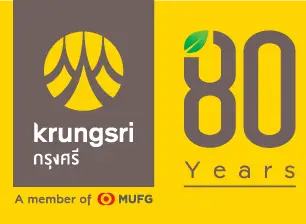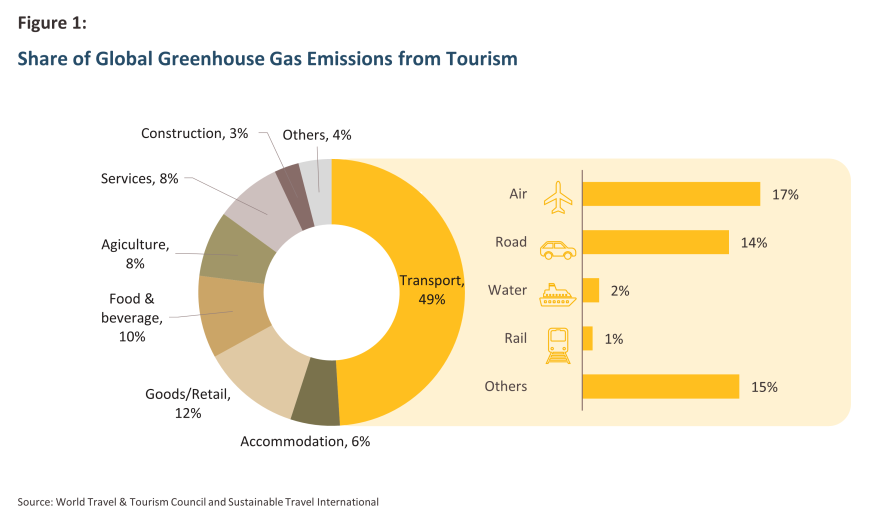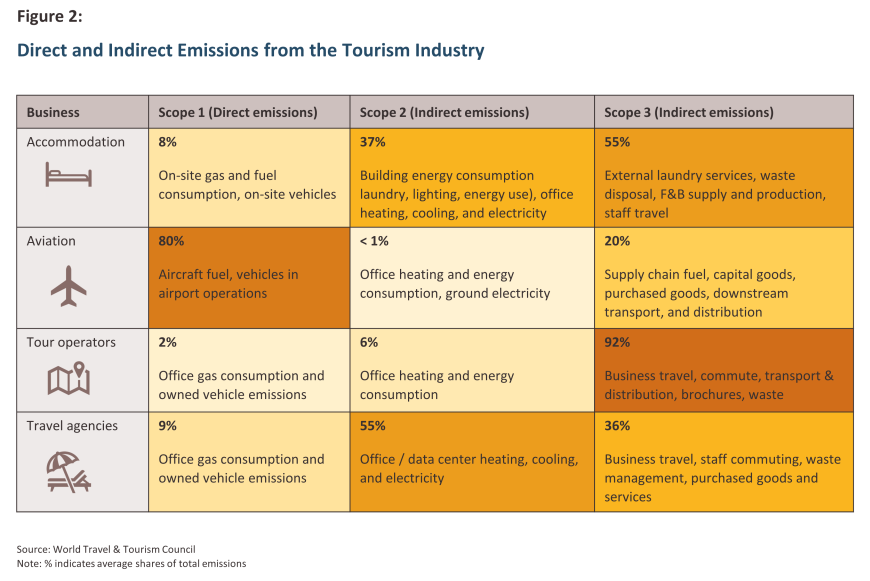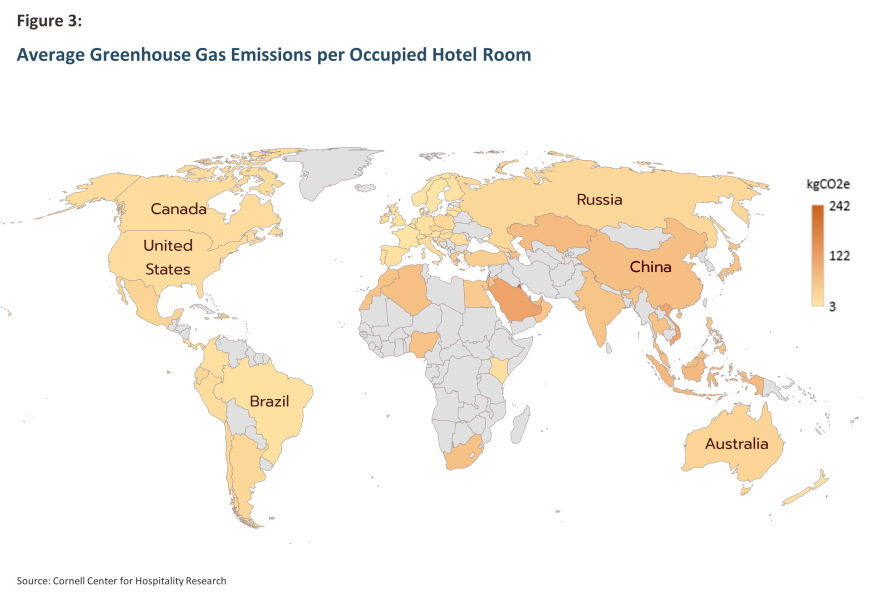Unfortunately, the release of greenhouse gases is associated with all stages of the tourist journey, from travel, through stays in hotels and on-site consumption, through to post-consumption waste disposal.
-
Consumption and waste management: The food and beverage industry is the source of around 10% of overall emissions from the tourism sector, but in addition to emissions resulting from the production and consumption of food, around a third of all food produced globally is wasted, thereby adding further to the release of greenhouse gases4/. Tourism contributes heavily to food waste, and their importance in these processes is underscored by the fact that a 5-star hotel can generate 50 kilograms of food waste for each serving buffet5/. Worse, if this is not properly managed and is simply buried in anerobic landfill sites, there is a high possibility that food waste will degrade into methane, which has a global warming potential that is 25-times that of CO26/. Beyond this, the tourism industry also contributes to worsening problems with waste from plastic and other types of packaging, and on average, the global tourism industry is responsible for adding another 8 million tonnes of plastic to the world’s oceans each year7/.
In addition to impacting the environment, the tourism industry is now itself being impacted by the climate changes that it has in part caused. For example, around 60% of beachfront resorts in the Caribbean are exposed to elevated flood risk as a result of rising sea levels, while climbing temperatures are disincentivizing summer travel and encouraging tourists to visit cooler destinations instead. Snowfall is also down by some 8.4% per decade in the Alps, and this is a significant threat to the future viability of some ski resorts8/.
In the case of Thailand, the Ministry of Tourism and Sports’ assessment is that the impacts of changes to the climate will vary by area. Over 2020-2029, locations on the Andaman coastline will face greater challenges accessing freshwater due to the shortening rainy season, but on the Gulf of Thailand side of the South, rising rainfall may impact outdoor activities. Likewise, in the Bangkok Metropolitan Region, there is a growing risk of heavier rains leading to flooding, the drop in the number of cooler nights during the Northern winter is robbing the area of one of its major high-season attractions9/, and the increased risk of drought in the Northeast is affecting the region’s ability to develop as a tourist destination Thailand10/
Community- and society-level impacts
Although tourism is often a major source of employment and earnings for local communities, growth in the industry may have significantly negative impacts on society across a broad front. These can include triggering changes to social norms and values, for example as these are expressed through dress, food, and lifestyles, and this can be deep enough that local identity may be irrevocably lost. Similarly, tourism can lead to communities losing their cultural inheritance, for example through damage to ancient sites, or the abandonment of local traditions or site-specific knowledge, and if tourists do not respect local traditions and cultures, one outcome may be conflict between travelers and local communities, while urban sprawl, which may be accelerated by growth in the tourism industry, also feeds into higher rates of crime. In addition, because the tourism industry, and especially hotels and restaurants, is highly labor intensive, problems with child or forced labor may be encountered and temporary workers may be saddled with unfair wages and working conditions.
It can be seen from the above that while the rapid expansion in global tourism has been a major contributor to rising incomes in many countries, this has also generated a broad range of environmental and social problems, which has in turn supported growing interest in issues around sustainable tourism and attempts to minimize tourism’s negative impacts and to maximize positive outcomes.
What is sustainable tourism and why does it matter?
What is sustainable tourism?
Sustainable tourism is a broad term that encompasses efforts to reduce the social and environmental impacts of tourism and at the same time, to create satisfaction and economic benefits for all stakeholders connected to the industry, whether that be tourists themselves, businesses offering travel-related goods and services, or local communities impacted by travel. In general, sustainable tourism can be understood with respect to three main areas (Figure 4).
-
Environmental concerns: This covers areas such as conservation and the preservation of biodiversity, the use of renewable energy, environmentally sensitive waste management policies, the reduction and elimination of demand for single-use plastic, and the promotion of low-carbon travel.
-
Social concerns: These include respect for and the promotion of local cultures and ways of life, and the preservation of a community’s cultural inheritance and local wisdom.
-
Economic concerns: This area encompasses issues such as the fair sharing of income from tourism and related activities, ensuring that communities benefit from tourism-generated jobs and income, and making concerted efforts to reduce poverty.
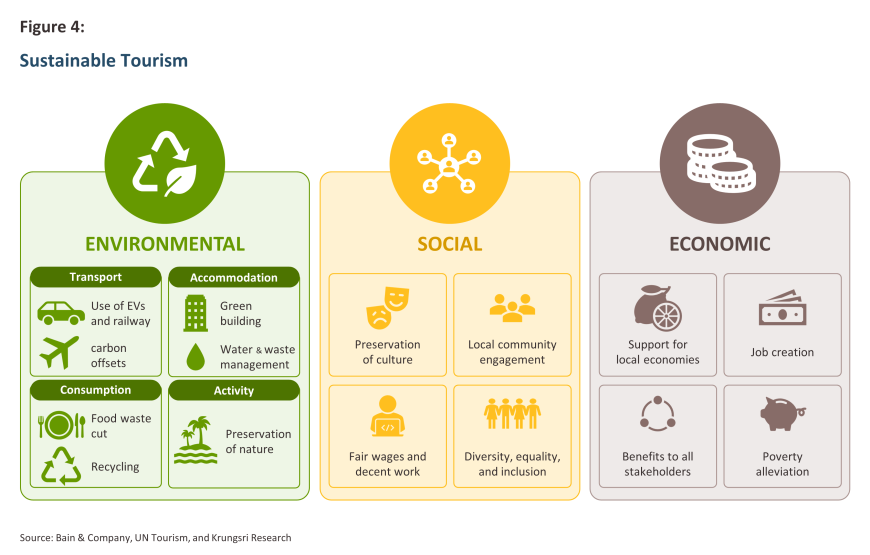
In addition to sustainable tourism, other related trends that also aim to generate positive environmental and social impacts include responsible tourism and regenerative tourism, and overall, these movements have been attracting rising levels of interest from consumers.
Why is sustainable tourism important?
1) Moving from a niche to a mass market
In the past, sustainable tourism occupied a niche space within the wider tourism market and appealed largely to those with an interest in environmental or community tourism, but the segment has grown rapidly and it now has the potential to transform itself into a mass market product. Future Market Insights thus expects that over 2024-2034, the global market for sustainable tourism will enjoy annual growth in excess of 20%, with nature-based tourism accounting for more than a third of the receipts generated from this in 202411/.
Growth in the market for sustainable tourism is being driven by changes to consumer behavior and increasing interest in sustainability. This is reflected in a 2024 survey by Booking.com12/, which shows that three-quarters of tourists would like to travel more sustainably within the next year. Over half of respondents also hoped to cut their energy use and to make more environmentally conscious travel decisions, while more than 40% felt guilty when they opted for less sustainable travel choices. These findings were reinforced by a survey by Agoda13/ that found that around 80% of Asian tourists favored purchasing sustainable travel packages, and that in Thailand, 84% of the public are ready to embrace greener travel options. Beyond this, consumers are also willing to pay a premium for sustainable tourism, and so a 2023 survey by Euromonitor International14/ found that almost 80% of respondents were prepared to pay a surcharge of at least 10% for eco-tourism products and services.
2) As the world moves toward sustainability, the tourism industry does likewise
Whether one considers the consensus view that the world needs to transition away from fossil fuels or the more specific target of meeting the 2050 net zero goals15/, global sustainability targets are becoming ever more demanding, and in its dual role as both a contributor to global warming and an industry that is exposed to these changes, the tourism sector clearly needs to keep pace with these global movements. Sustainable tourism also has an important role to play within the 2030 Agenda for Sustainable Development16/ and so a number of international organizations have pushed for the further expansion of the sustainable tourism industry, including UN Tourism. The latter has initiated projects that include the Global Tourism Plastics Initiative, under which more than 200 organizations have pledged to transition away from the use of single-use plastics, and the Hotel Energy Solutions program, which aims to improve energy efficiency in European hotels17/. The Global Sustainable Tourism Council (GSTC) has also laid out sustainability standards and established appropriate certification programs for players in the tourism industry globally, including hotels, tourist sites, and tour operators18/. Many countries are in addition promoting sustainable tourism through national laws. In the case of Bhutan, overseas visitors have to pay a USD 100/night tourist surcharge, which is then used to fund environmental and cultural conservation schemes as well as to pay for reforestation projects that help to offset tourism-related carbon emissions19/, while in Croatia, a 2024 law on tourism aims to address problems related to overtourism and to promote local community-based travel20/.
Current state of sustainable tourism in Thailand
Competitiveness of the Thai sustainable tourism industry
Although the overall Thai tourism industry remains competitive on the world stage, development of the sustainable tourism segment currently lags behind that of many other countries. Thus, the World Economic Forum’s (WEF) 2024 Travel and Tourism Development Index ranks Thailand 47th out of the 119 countries, placing the country 4th in the ASEAN region behind only Singapore, Indonesia, and Malaysia (Figure 5). However, Thailand’s most recent ranking has worsened, falling from 35th in 2021 and 41st in 2019, and more importantly for the current discussion, Thailand's performance in sustainable tourism shows room for improvement21/, scoring below the average for the ASEAN zone, the broader Asia-Pacific region, and the world at large, while by contrast, the US and Europe lead the sustainability index. Likewise, Thailand lags significantly in the 2023 Euromonitor International Sustainable Travel Index Ranking, placing 80th out of 99 countries in a field that is led by European nations with Sweden, Finland, and Austria being the top three spots.
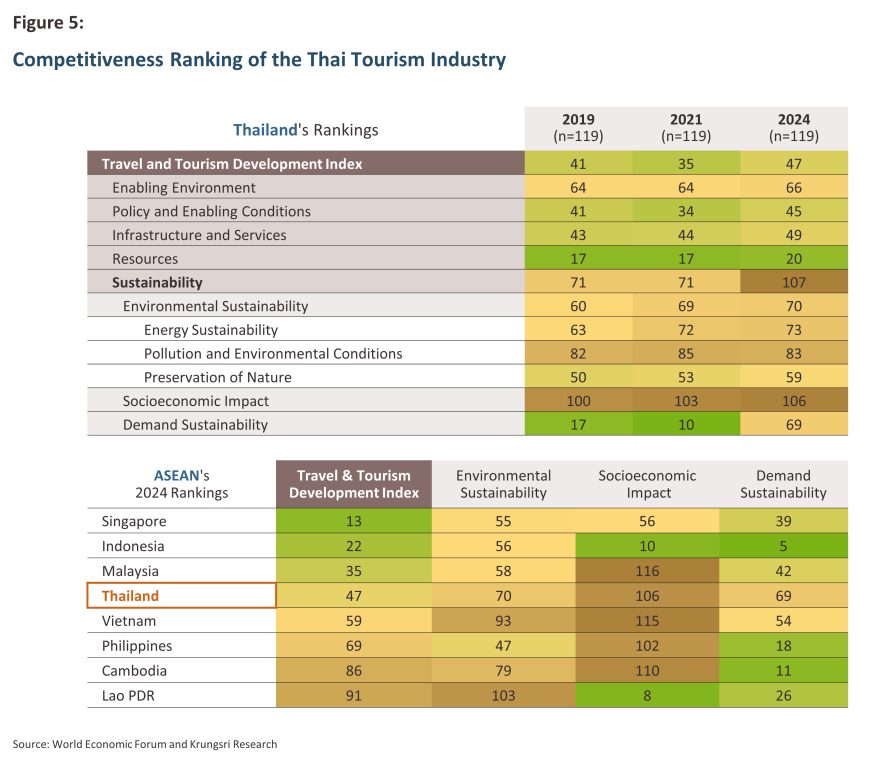
Examining the details of the WEF report reveals the weaknesses in Thailand's sustainable tourism industry. In the environmental category, Thailand lags in both the use of renewable energy and wastewater management within the tourism sector, and this may be one reason why Thai hotels are emitting more greenhouse gases than the global average22/. Thailand also needs to improve its scores for generating positive impacts on labor markets and incomes, and for the sustainability of demand since at present, Thai operators are overly reliant on income generated during the peak season.
Policies and measures supporting sustainable tourism
While Thailand has been slow to develop its sustainable tourism offerings, the country is transitioning to a more environmentally friendly stance, and as part of this, the authorities have been proactively introducing measures to encourage businesses to adopt a sustainable approach. These efforts may be classified into three groups.
1) Establishing models and frameworks to support the development of sustainable tourism
The Ministry of Tourism and Sport has established the Designated Areas for Sustainable Tourism Administration, or DASTA. This is a public organization that has been given the task of promoting sustainable tourism in accordance with the Global Sustainable Tourism Criteria. At present, DASTA has designated nine areas as sites for the promotion of sustainable tourism, many of which have received global awards for their sustainable tourism (Figure 6). These nine are: (i) Ko Chang; (ii) Pattaya City; (iii) the Sukhothai, Si Satchanalai, and Kamphaeng Phet historical parks; (iv) Loei; (v) U-Thong old town; (vi) Nan old town; (vii) Songkhla Lagoon; (viii) Khung BangKachao; and (ix) Chiang Rai. In addition, DASTA has also developed the Sustainable Tourism Management Standards23/, approved by the Global Sustainable Tourism Council24/ for use by government agencies (especially community-level organizations) that are responsible for promoting sustainable tourism.
Alongside this, the Tourism Authority of Thailand (TAT) has been promoting carbon neutral tourism through the adoption of the ‘measure-reduce-offset’ principles. This entails reducing an operation’s carbon footprint and then using carbon credits to offset any remaining emissions that cannot be avoided. To this end, the TAT has helped to develop model net-zero-emission tourist destinations, including Baan Tham Sua Homestay in Phetchaburi Province and Rai Keun Rang Farmstay in Nakhon Ratchasima Province, agritourism destinations that help visitors experience local ways of life25/.
2) Preparing to measure, reduce and offset business-related carbon emissions
Thai businesses, including those in the tourism sector, typically lack the skills and experience necessary to assess their emissions, and so government agencies are developing a range of tools that will help organizations measure their carbon footprint. This includes the CF-Hotels website, which was created by the TAT in association with Chiang Mai University. The website helps hotel operators assess their carbon emissions, prepare applications for Carbon Footprint for Organization (CFO) certification, and plan for future reductions in emissions26/. As of August 26, 2024, 342 hotels had submitted data on their emissions, and between 2017 and July 2024, this had led to a cumulative reduction in emissions worth 87,641 tCO2e27/. Public- and private-sector organizations have also worked together to develop the Zero Carbon app, which helps tourism businesses assess their carbon footprint, while tourists themselves can do likewise and then purchase the carbon credits to offset the emissions resulting from their activities28/.
3) Encouraging companies to apply for sustainability certification
Thai government agencies are now providing certification for companies active in sustainable tourism including hotels, tour operators, restaurants, transport companies, and operators of tourist destinations. These typically provide awards to companies or allow qualifying businesses to display an accreditation standard (e.g., the Green Hotel or Sustainable Tourism Acceleration Rating (STAR) awards), and it is hoped that these kinds of public displays of quality guarantees will help to encourage a growing share of tourism companies to adopt sustainability standards. Details of some of these are given below.
Thai tourism and sustainability standards
The combination of rising private-sector awareness and public-sector pressure is encouraging an ever-greater share of Thai companies active in the tourism industry to apply for national and international sustainability accreditation. Some of the most important of these schemes are described below (summarized in Figure 11).
1) Domestic accreditation
-
Green Hotel award: This award, which is operated by the Department of Climate Change and the Environment, recognizes hotels that have implemented systems that ensure the efficient use of resources and energy. Applicants are also required to demonstrate respect and care for the environment, and for the local culture and community. Between 2019 and 2023, 306 hotels participated in the scheme29/, with 121 gold, 102 silver and 83 bronze awards given out during this time. However, only 1% of all Thai hotels are covered by the project30/, and although recipients of the Green Hotel award can be found in 34 different provinces, three-quarters of these are in the major tourist destinations of Bangkok, Phuket, Krabi, Chonburi, and Surat Thani, and so in most second-tier provinces, there are few to no recipients (Figure 6). In addition, Green Hotel awards have overwhelmingly gone to larger operators, and so it appears that interest in the scheme is limited to major players in the most important tourist destinations. Recently, the accreditation system has been further developed, a process that has led to the ‘Green Hotel Plus’ scheme, and in June 2024, this was recognized by the Global Sustainable Tourism Council. Thai standards for sustainable tourism are thus being more broadly accepted on the world stage31/, and this should help to build greater interest among domestic hoteliers.
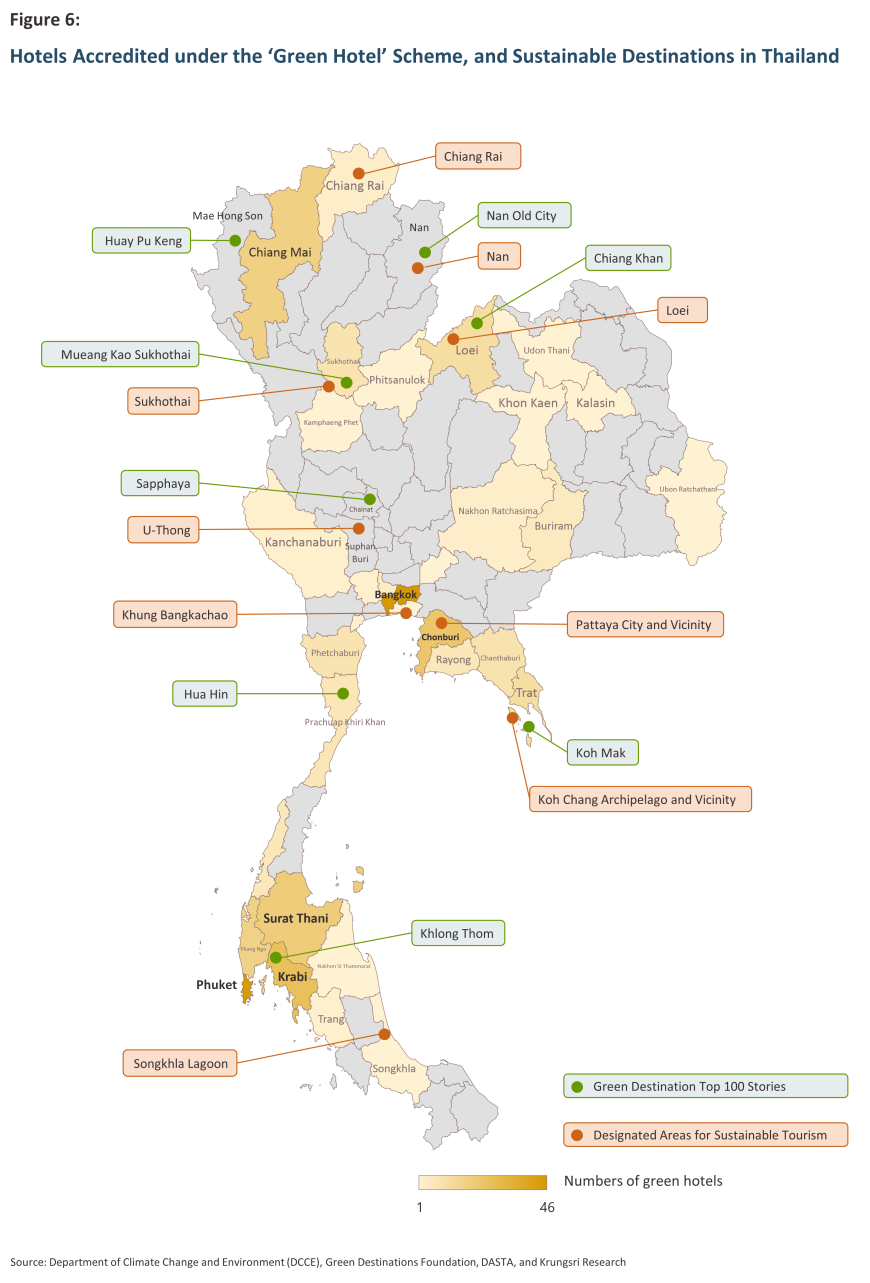
-
Sustainable Tourism Acceleration Rating (STAR): The Tourism Authority of Thailand awards the STAR certification to businesses active in the tourism sector (e.g., hotels, tourist sites, retailers, tour companies, travel operators, etc.) on a sliding scale of 3 (the least) to 5 (the most) stars according to how fully the company meets the Sustainable Tourism Goals (STGs)32/. As of August 1, 2024, 830 companies had achieved STAR accreditation, of which 651 companies had been awarded 5 stars, 70 had received 4 stars, and 109 had gained 3 stars. Around 60% of all companies recognized under the scheme are accommodation or homestay businesses (Figure 7). Interest in the STAR scheme is growing rapidly, as compared to 478 companies achieving STAR accreditation as of January 3, 202433/. This sharp increase in numbers may reflect an overall deepening recognition of the importance of issues around sustainability within the tourism sector.
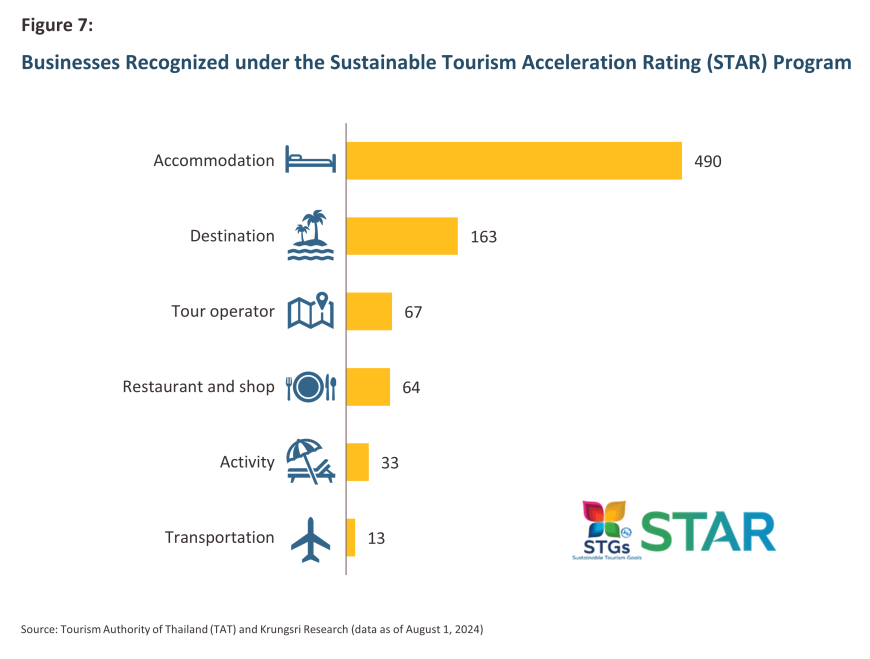
-
The Thailand Tourism Awards: Every 2 years, the Tourism Authority of Thailand (TAT) awards these prizes to tourist destinations, accommodation services, and tourism programs across a broad range of categories including areas such as nature tourism, community tourist sites, and historical and cultural tourism. In 2023, the TAT introduced a new category of awards for low carbon and sustainable tourism, reflecting the growing importance of sustainable travel and tourism. Organizations recognized in this category include the Bang Kobua Community Based Tourism Club in Samut Prakan, Siam Bayshore Resort in Chonburi, and Peach Hill Resort in Phuket34/.
2) Global sustainability certification
-
Green Destinations: This assesses the sustainability of global travel destinations according to the criteria accredited by the Global Sustainable Tourism Council, and each year, the organization presents awards as part of the ‘Green Destinations Top 100 Stories’. These recognize travel destinations worldwide that excel in sustainability, and over 2020 to 2023, eight Thai destinations were recognized for this: (i) Chiang Khan, Loei Province; (ii) Nai Wiang, Nan Province; (iii) Mueang Kao, Sukhothai Province; (iv) Koh Mak, Trat Province; (v) Ban Huay Pu Keng, Mae Hong Son Province; (vi) Saphaya Community Enterprise, Chainat Province; (vii) Khlong Thom, Krabi Province; and (viii) Hua Hin, Prachuap Khiri Khan Province35/ (Figure 8). In addition, in 2024, Chiang Khan also received the Green Destinations Silver Award for its sustainability efforts36/. This was the first site in the ASEAN zone to receive this award, and after Japan and Taiwan, Thailand is only the third country in Asia to be recognized in this way. It can be seen that whereas in the past, Thai tourist destinations were focused more on cultural and community-based tourism, these are now receiving greater recognition for their environmental achievements. Thus in 2023, four Thai tourist destinations were awarded prizes, all of which were for these sites’ contributions to environmental and nature-based tourism (Figure 9).
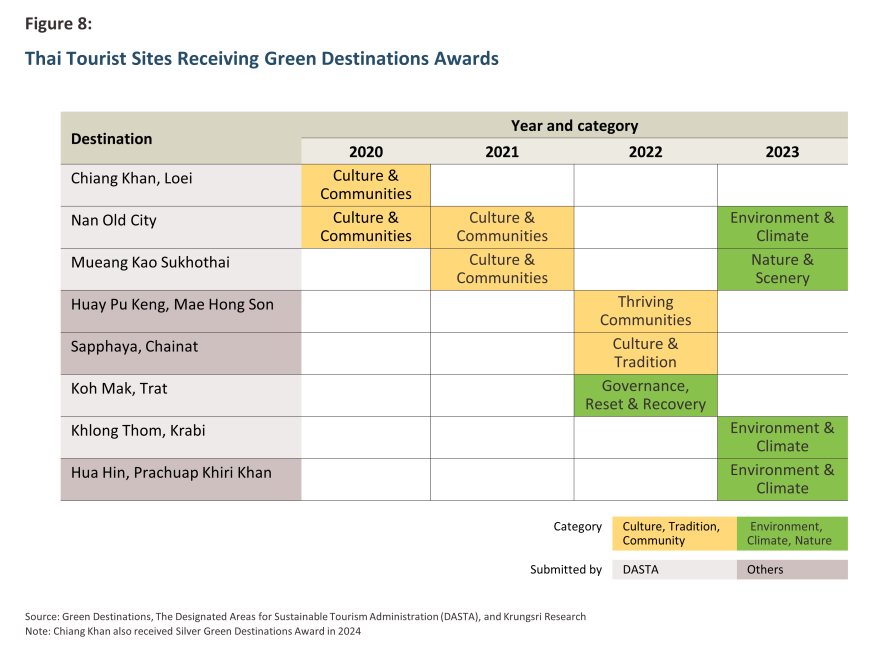
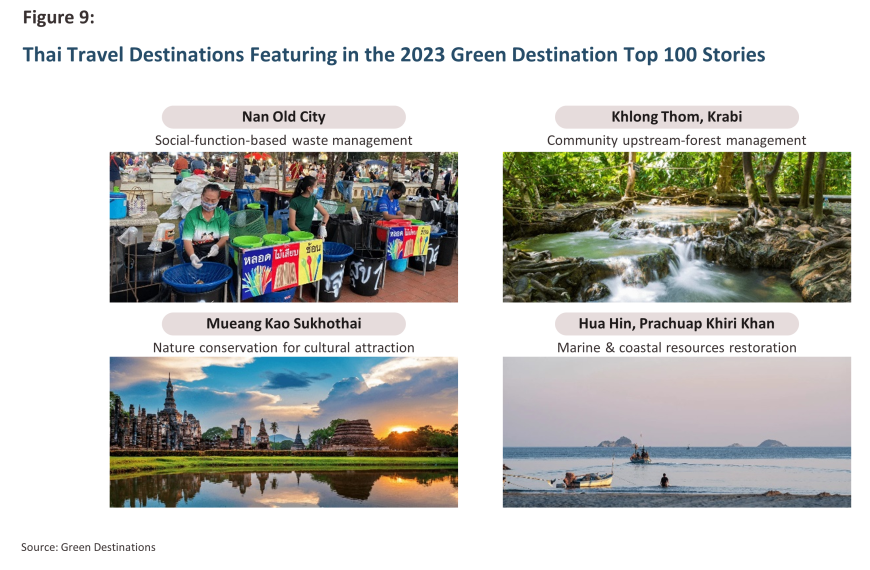
-
EarthCheck: This organization evaluates and recognizes tourism- and travel-related companies that minimize negative impacts on local communities, society and the environment. Locations that pass the evaluation criteria are then able to advertise their sustainability standards by displaying the ‘EarthCheck Certified’ mark. As of August 2024, nine Thai hotels were certified by EarthCheck37/, though all of these are large, high-end operations in the four tourist provinces of Bangkok, Krabi, Phuket, and Surat Thani (e.g., the Banyan Tree and Kempinksi hotel chains).
-
Green Globe: Green Globe uses the United Nations’ SDGs to assess the sustainability of companies active in the tourism industry. Fifteen hoteliers that are active in Thailand have achieved Green Globe certification38/, though most of these are major international hotel chains, such as Mövenpick, Pullman and Sofitel.
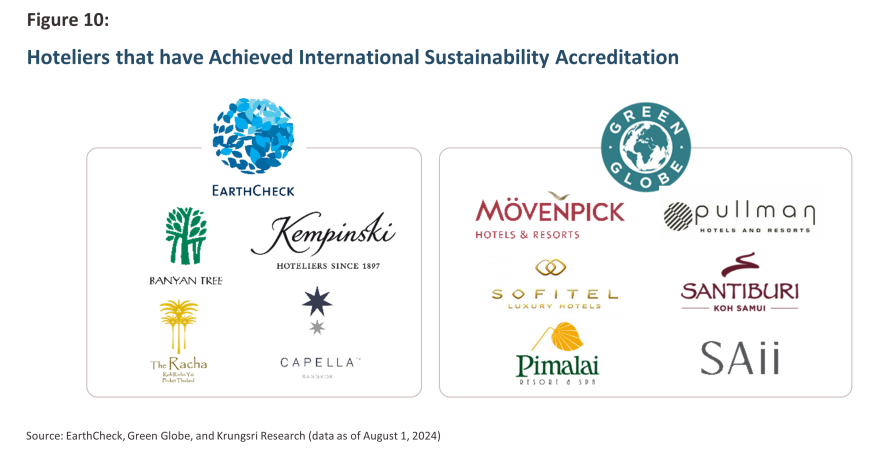
In addition to the schemes described above, accreditation is also provided by other international organizations such as Travelife, Rainforest Alliance, Green Key and Vireo Srl. These organizations use environmental and social criteria to assess sustainability and issue certifications to businesses, including hotels, travel agents, and operators of tourist attractions.
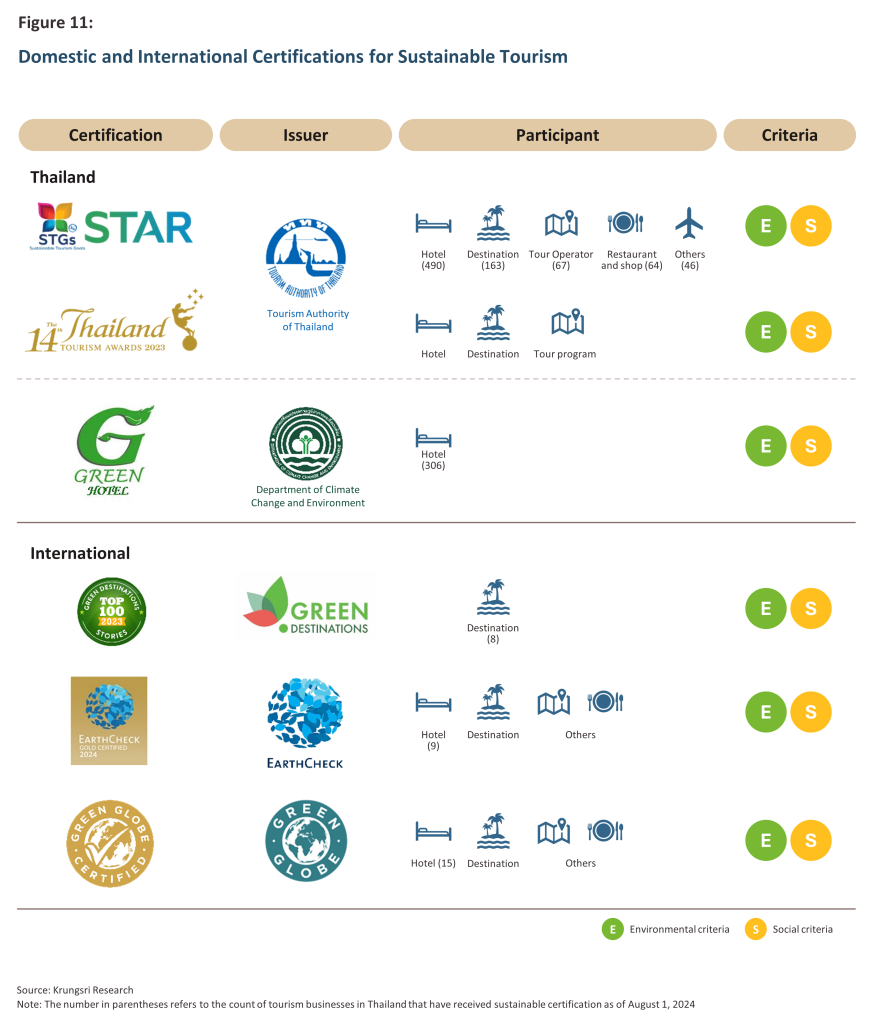
Opportunities and challenges arising from growth in sustainable tourism
Growth in the Thai sustainable tourism industry should track global rates of expansion, and so Future Market Insights sees the domestic market growing from a total value of USD 33.2 million (around THB 1.1 billion) in 2024 to USD 143.9 million (approximately THB 4.9 billion) a decade later. This would thus represent average annual growth of 15.8%39/. Within the overall domestic market for sustainable tourism, segments that will attract greater interest will include the following.
-
Low-carbon tourism, guided by the ‘measure-reduce-offset’ framework is set to become a key factor in directing the future development of Thai tourist destinations. One recent example is Koh Mak, an island in Trat Province, which was selected in 2022 for inclusion in the Green Destination Top 100 Stories. A wide range of low-carbon measures have been implemented on Koh Mak, including the use of solar energy in farming and to power ferries, schemes to reduce plastics, and support for the circular economy. The local authorities have also issued the ‘Koh Mak Charter’, a shared commitment to ensuring that the impacts of tourism on the environment and the local community are kept to an absolute minimum. Additionally, the Koh Mak Low Carbon Calculator can be accessed online. Beyond this, details on more than 100 low-carbon tourism routes/destinations have been assembled by the Thai Ecotourism and Adventure Travel Association40/. These cover both nature-based travel (e.g., to national parks and wildlife sanctuaries) and cultural and artistic tourism.
-
Community-based tourism is tourism that is managed by local communities with the goal of ensuring that these can maximally benefit from travel and tourism. Community tourism may involve offering visitors the opportunity to learn about the local culture, food, and handicrafts, and to enjoy local homestays. A survey conducted as part of the SWITCH-Asia program found that within Thailand, community-based tourism was popular with families, the elderly, working-age tourists, and wealthier individuals, and that in order, the five most important community tourist destinations are Chiang Mai, Phuket, Sukhothai, Nan, and Chiang Rai41/. Examples of successful community tourism undertakings include Ban Rai Kong Khing in Chiang Mai Province, where visitors can learn about local health and wellness practices using locally sourced plants and herbs42/, and Bo Suak in Nan Province, where visitors can find out about local handicrafts such as pottery and weaving43/.
Growing interest in and demand for sustainable tourism services will open up new opportunities for a wide range of businesses, including hotels, travel companies, restaurants and tour companies. However, these players will need to rapidly adapt their operations to the changing requirements of this segment. The businesses facing these challenges include the following.
-
Hotels and restaurants: These businesses are major sources of employment and income. However, due to growing consumer interest in sustainability, they are facing increasing pressure to adapt to changing market demands for food services and accommodation. Players will thus need to confront and to overcome the challenges involved in reducing their greenhouse gas emissions, particularly indirect emissions. Routes to achieving these goals may include applying for Thailand’s Green Hotel certification, which is gaining steady interest, or seeking other green building accreditations, such as the US LEED (Leadership in Energy & Environmental Design) and Thailand’s own TREES program (Thai Rating of Energy and Environmental Sustainability). For companies passing these certifications, one benefit is that this will entail raising the efficiency with which they use energy, water and other resources. Restaurants and hotels also need to avoid generating negative impacts on communities in the surrounding area, for example by ensuring that they institute effective waste management processes, increase their use of recyclable and biodegradable inputs, and source goods from environmentally responsible suppliers, where possible within the local community.
-
Transport: This is the most carbon intensive segment of the tourism market since transportation is generally still highly dependent on the use of fossil fuels. Nevertheless, players are making significant efforts to reduce their emissions, and this includes widespread experimentation with sustainable aviation fuel (SAFs) by Thai and international carriers, while looking further out into the future, aviation emissions may be reduced by the increasing use of electric, hybrid, or alternative-energy planes. On the passenger side of the equation, airlines are now offering flyers the opportunity to buy offsets to set against their own emissions44/. Other types of low-carbon transport are also gaining ground, including ride sharing apps such as MuvMi, which provides travel services using 100% electric-powered tuk-tuks, and bike-sharing programs that make it easy for visitors to bicycle around tourist sites.
-
Travel agents: Online travel agents that allow consumers to buy airline tickets, book hotels, and purchase package tours have been quick to adjust to changing market conditions and to ensure that they provide services that are a fit with consumers’ growing environmental concerns. This includes displaying evidence of accreditation for the provision of eco-friendly accommodation, providing information on the carbon footprint associated with particular flights, offering travelers the opportunity to buy offsets to set against their own travel-related emissions, and fundraising for environmental projects (Figure 12). These companies’ embrace of sustainability is, however, adding to the pressure on businesses selling through these platforms to do likewise, since as consumers gain greater insight into hotels’ and airlines’ environmental credentials, competition for space in this new market is intensifying. Thus, hotels selling through booking.com need to be sure to demonstrate evidence that they meet environmental standards, otherwise they risk being overlooked by ‘green travelers’.
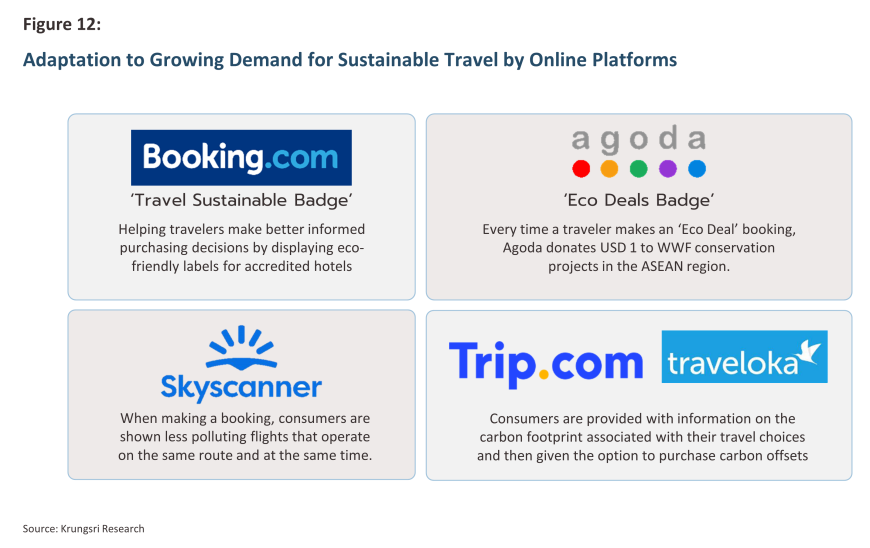
Nevertheless, the opportunities and threats associated with the transition to sustainable tourism do not impact companies in isolation. Rather, because businesses exist only within the broader context of the tourism ecosystem, operations are intimately connected to one another through complex value chains, and it is therefore crucial that companies move forward together to collectively drive the development of the Thai market for sustainable tourism.
Krungsri Research view: How will the Thai tourism industry balance economic growth with environmental and social commitments?
Although the tourism industry has been one of the Thai economy’s star performers over the past few decades, darkening clouds are hindering the industry’s ability to power growth. In particular, although these are in many ways a direct consequence of the country’s embrace of mass tourism, problems connected to sustainability are worsening to the point that the industry’s environmental impacts now threaten to undermine its international competitiveness. This has then spurred growing interest in sustainable tourism, but it is clear that greening the industry will be a significant challenge, and structural changes will need to be made simultaneously across a broad swathe of the industry. This will include transitioning to the use of clean energy, implementing much better waste management systems, integrating and managing supply chains more effectively, and raising the level of community and social participation in commercial ventures. Against this backdrop and to ensure that tourism retains its central place as a driver of growth, while also minimizing future environmental impacts, Krungsri Research believes that it is important for all stakeholders connected to the industry to engage in the following.
-
Assessing the environmental impacts of tourism-related activities: It is essential that companies active in the tourism sector have a good understanding of their environmental and social impacts, though it is particularly important that they assess their own carbon footprints. Unfortunately, most Thai companies are not yet in a position to do this, and more than half of the corporations registered on the Thai stock exchange do not report their carbon emissions, while it is very likely that among SMEs, the proportion of companies making informed environmental assessments of their own activities is substantially lower. Nevertheless, tools are being rolled out to address these issues, and organizations can evaluate their carbon footprint using the CF-Hotels website, the Zero Carbon app, and the SET’s online platform, which is currently being developed45/. This will then help companies prepare for and participate in standardized and widely accepted schemes for measuring, reporting and verifying their emissions. Indeed, in the coming period, reporting will tend to move from a voluntary to a compulsory basis, as for example seen in the reporting of emissions by airlines enforced through the CORSIA agreement, and the requirements imposed by Thailand’s proposed draft climate change bill.
-
Reducing the tourism industry’s carbon emissions: Carbon emissions are associated with activity at all stages of the tourist journey, from travel through accommodation to dining. Making inroads into emissions from such a complex market is a challenge and requires the implementation of comprehensive and multi-layered processes. This will include encouraging greater uptake of environmentally friendly travel through the development of low-carbon public transport networks (e.g., expanding the use of electric buses and rail transport) and supporting the increased use of sustainable fuels (e.g., by setting a minimum level of SAFs that airlines are required to use). Promoting the development of green hotels and restaurants may be achieved by incentivizing companies to put sustainability standards at the heart of their operations and then encouraging consumers to divert their spending to these businesses. Problems with waste management within the tourism industry could be addressed by looking at noteworthy schemes that have been implemented abroad, including charging for plastic bags (as in the UK) and operating a deposit return scheme for packaging and containers (as in the EU), both of which have contributed to significant reductions in plastic waste46/. However, given the fact that Thai businesses are still in the process of adapting to these changes, and many companies, in particular SMEs, are having to adapt to evolving market conditions through a process of trial and error, rolling out models for how sustainability can be implemented within the industry would likely prove to be extremely useful.
-
Applying for domestic and international accreditation: Because these schemes typically extend beyond narrowly environmental considerations to include an assessment of a business’s impacts on both the local community and the wider society, accreditation will help to keep companies on the path to creating sustainable businesses that have positive impacts on society. Although at least initially, the need to adjust operations and working procedures and to pay for assessments and certification will impose higher costs, over the longer run, accreditation should generate cost savings from lowered demand for inputs and more efficient energy use. Moreover, there are clear marketing benefits to be gained from environmental certification, and a survey carried out by Booking.com shows that almost half of travelers find hotels certified as eco-friendly more attractive than other accommodations. Companies that fail to take advantage of these opportunities are thus at risk of losing customers and of being disqualified from help with marketing from government agencies47/.
In addition to policymakers and businesses themselves, the finance industry also has an important role to play in developing the sustainable tourism industry. This will be achieved through the use of a wide range of financial products and services, including transition loans to help with the costs of greening a business48/, blue bonds, which help to pay for maritime conservation efforts49/, and credit cards that offer discounts for travelers staying at green hotels50/. Ultimately, the finance and banking industry is extremely well placed to help power the tourism industry’s transition to a new, improved and most importantly sustainable form that meets the needs of consumers, generates benefits for all stakeholders, and responds to rising national and international demands for sustainability.
References
Bain & Company. (2023). ”Sustainable Tourism: An Untapped Opportunity for Green Growth”. Retrieved from
Booking.com. (2024). ”Sustainable Travel 2024”. Retrieved from https://news.booking.com/download/904910bb-db77-4886-9ead-accbf87ad891/sustainabletravelreport2024.pdf
Euromonitor International. (2023). ”Sustainable Travel Index: Ramping Up Action for Positive Change”. Retrieved from Euromonitor International´s market research database
National Statistical Office. (2023). “The 2022 Accommodation Survey”. Retrieved from
Thailand Science Research and Innovation. (2020). ”The future of Thai tourism and global warming”. Retrieved from https://researchcafe.tsri.or.th/the-future-of-thai-tourism/
Thanayut Boonthong et al. (2021). "Sustainable Tourism: Opportunities and Challenges for the Thai Tourism Sector". Retrieved from https://www.bot.or.th/th/research-and-publications/articles-and-publications/articles/regional-articles/reg-article-2021-16.html
World Economic Forum. (2023). ”Rising global temperatures are already affecting the tourism industry - here's how”. Retrieved from https://www.weforum.org/agenda/2023/08/temperatures-tourism-climate-impact/
World Economic Forum. (2024). ”How travel and tourism can reach net zero”. Retrieved from https://www.weforum.org/agenda/2024/01/travel-tourism-industry-net-zero/
World Travel & Tourism Council. (2021). “A Net Zero Roadmap for Travel & Tourism”. Retrieved from
1/ Centre for Sustainable Tourism (ZENAT),
2/ Thai PBS, https://www.thaipbs.or.th/news/content/279964
3/ The Cornell Center for Hospitality Research compiles annual data on the hotel industry and includes data on carbon emissions, and energy and water use. This is collected from more than 27,000 businesses in 83 countries (source: Greenview, https://greenview.sg/services/chsb-index/)
4/ TDRI, https://tdri.or.th/foodwaste/#01dish
5/ Travelife, https://asia.travelife.info/wp-content/uploads/2024/05/PATAs-practical-path-to-reduce-Plastic-and-Food-waste.pdf
6/ TGO, https://ghgreduction.tgo.or.th/th/download-tver/120-tver-gwp-emission-factor/2692-global-warming-potential-gwp-t-ver.html
7/ United Nations Environnent Programme,.
8/ World Economic Forum, https://www.weforum.org/agenda/2023/08/temperatures-tourism-climate-impact/
9/ Thailand Science Research and Innovation, https://researchcafe.tsri.or.th/the-future-of-thai-tourism/
10/ United Nations Development Programme, https://www.undp.org/stories/climate-impact-thailand-th
11/ Future Market Insights, https://www.futuremarketinsights.com/reports/sustainable-tourism-sector-overview-and-analysis
12/ The survey sample comprised more than 30,000 individuals from 34 countries who planned to travel in 2024.
13/ The results were drawn from a sample of more than 10,000 individuals in 10 countries in Asia.
14/ The survey was based on answers provided by over 40,000 consumers worldwide.
15/ For more details on progress on meeting global sustainability targets, please see: https://www.krungsri.com/en/research/research-intelligence/cop28-2024
16/ United Nations, https://sdgs.un.org/topics/sustainable-tourism
17/ UN Tourism, https://www.unwto.org/sustainable-development
18/ GSTC, https://www.gstcouncil.org/certified-sustainable-destinations/
19/ Bhutan is the only country in the world that is currently carbon negative. (source: SpringNews, https://www.springnews.co.th/keep-the-world/sustainable/849698)
20/ euronews, https://www.euronews.com/travel/2024/05/05/could-croatia-be-the-most-sustainable-travel-destination-in-europe-its-tourism-minister-ho
21/ The sustainable tourism score is calculated from a number of indicators, including: (i) environmental sustainability (e.g., greenhouse gas emissions, use of renewables, etc.); (ii) socioeconomic impacts (e.g., employment, wages, gender equality, etc.); and (iii) demand sustainability (e.g., seasonal variation in arrivals, public interest in tourist destinations, etc.) (source: WEF, https://www.weforum.org/publications/travel-tourism-development-index-2024/)
22/ Thai hotels release an average of 0.061 tCO2e per room, significantly above the global average of 0.026 tCO2e, although this is still below the ASEAN average of 0.069 tCO2e (source: Cornell Hotel Sustainability Benchmarking Index 2024).
23/ DASTA, https://www.dasta.or.th/th/article/1495
24/ GSTC, https://www.gstcouncil.org/thailand-sustainable-tourism-management-standard-is-now-gstc-recognized /
25/ TAT, https://www.tatnewsthai.org/news_detail.php?newsID=5225
26/ Hotels are able to use data submitted to the CF-Hotels website to support their application for the TAT’s STAR accreditation. In particular, this applies to efforts to reduce greenhouse gas emissions (STG 13 Climate Action), one of three core areas covered by the STAR system.
27/ Companies enrolling in the scheme may report emissions reductions relative to those made in a baseline year or they may report the scale of emissions reductions achieved through the implementation of carbon-reduction projects (source: TAT, https://cf-hotels.com/)
28/ Bangkok Post, https://www.bangkokpost.com/thailand/general/2610421/zero-carbon-tourist-app-launched
29/ The Department of Climate Change and the Environment announces the results of the Green Hotel accreditation scheme each year. Certificates issued under the scheme are valid for 3 years, though during the pandemic, the validity of some certifications was extended. As of September 2024, 238 Thai hotels held a valid certification.
30/ A survey carried out by the National Statistical Office of Thailand found that there were 30,786 hotels in Thailand (source: NSO, https://www.nso.go.th/nsoweb/storage/survey_detail/2023/20230929154600_61861.pdf)
31/ GSTC, https://www.gstcouncil.org/thailands-green-hotel-plus-gains-gstc-recognized-standards-status/
32/ The Sustainable Tourism Goals (STGs) are derived from the Sustainable Development Goals (SDGs), and within these, there are a further 17 sub-goals that cover society and the environment. Under the STAR program, companies receive: (i) 3 stars if they pass three core STG goals (STG 13 (Climate Action), STG 16 (Safety for All) and STG 17 (Partnership for STGs)); (ii) 4 stars if they pass the 3 core goals and 6 other goals (9 in total); and (iii) 5 stars when they pass the 3 core goals and 9 other goals (12 in total). Certification is valid for 2 years. (source: TAT, https://www.tatstar.org/)
33/ Thairath, https://www.thairath.co.th/futureperfect/articles/2753903
34/ TAT, https://tourismawards.tourismthailand.org/awards-winner/gold-awards/low-carbon
35/ Dailynews, https://www.dailynews.co.th/news/2814105/
36/ Sites qualifying for a silver award need to meet at least 70% of all criteria, while featuring in the Top 100 list requires meeting just 20% of the total (source: Kaoupdate, https://kaoupdate.com/2024/02/19/60658-green-destinations-award/)
37/ Globally, 529 sites had achieved EarthCheck certification as of August 2024.
38/ As of August 2024, a further 18 hotels were in the process of applying for Green Globe certification (source: Green Globe, https://www.greenglobe.com/asia-pacific-indian-ocean-members)
39/ Future Market Insights, https://www.futuremarketinsights.com/reports/thailand-sustainable-tourism-market
40/ TEATA, https://carbonneutral.tours/elements/carbon-neutrality-tourism-routes/
41/ The SWITCH-Asia program is supported by the EU. For more survey results, see: https://asia.travelife.info/wp-content/uploads/2024/05/Community-based-tourism-and-human-rights.pdf
42/ DASTA, https://cbtthailand.dasta.or.th/webapp/community/content/12/
43/ DASTA, https://cbtthailand.dasta.or.th/webapp/community/content/42/
44/ Sustainable aviation fuels are made from biomass or agricultural and industrial waste, and their use can result in reductions in carbon emissions of up to 80% relative to standard jet fuel (for more details on efforts to improve aviation sustainability, see: https://www.krungsri.com/en/research/research-intelligence/corsia-2024)
45/ The Stock Exchange of Thailand, https://www.set.or.th/th/about/setsource/news-release/article/532-set-carbon
46/ Bangkokbiznews, https://www.bangkokbiznews.com/environment/1138084
47/ The TAT is encouraging enrollment in the STAR scheme by potentially withholding marketing support from companies without STAR certification (source: Dailynews, https://www.dailynews.co.th/news/3765431/)
48/ The Krungsri SME Transition Loan helps businesses pay for the greening of their operations. Loans are for 10 years, with interest set at 3.5% for the first 2 years (source: Krungsri, https://www.krungsri.com/th/business/loans/krungsri-sme-transition-loan)
49/ The Export–Import Bank of Thailand has issued ‘blue bonds’ worth THB 3 billion. These have been underwritten by Krungsri and the Government Savings Bank and the funds raised have been used to fund the development of businesses connected with coastline and maritime conservation and sustainability, e.g., seafront hotels and tourism businesses, fishing industries, aquaculture undertakings, and wastewater treatment plants (source: Bangkokbiznews, https://www.bangkokbiznews.com/environment/1137556)
50/ The KTC credit card offers holders discounts when they stay at ‘Green Hotels’ (source: KTC, https://www.ktc.co.th/ktcworld/travel-service/travel-story/thailand/green-hotel-accommodation-closer-to-nature)
